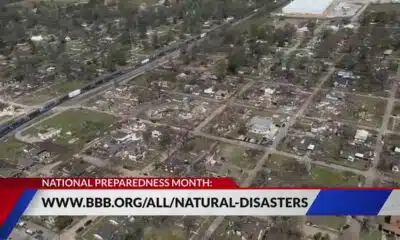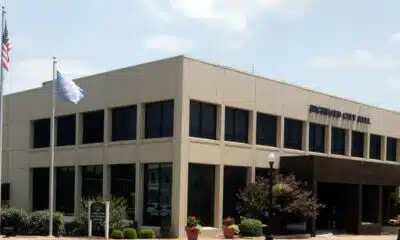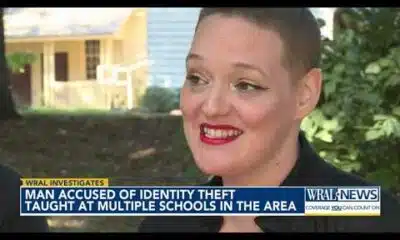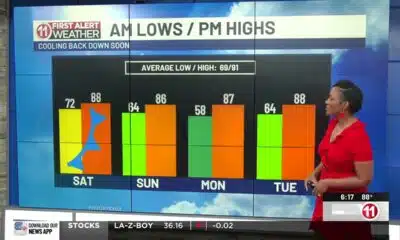News from the South - West Virginia News Feed
WV Republicans, who won nearly every election in 2024, focused on ‘election integrity’ this session
WV Republicans, who won nearly every election in 2024, focused on ‘election integrity’ this session
by Amelia Ferrell Knisely and Lori Kersey, West Virginia Watch
March 18, 2025
In the wake of West Virginia Republicans winning nearly every election in November, the GOP supermajority has spent a bulk of the 2025 legislative session on bills they say will increase election integrity.
Democratic lawmakers argue that conspiracy theories are guiding the onslaught of election bills this session.
There have been 93 elections- or voting-focused bills introduced this legislative session, and Republican-backed measures meant to clean up the voter rolls, restrict immigrants’ voting rights, make judicial races partisan and more have dominated committee agendas. The Senate already signed off on a measure that would clarify voter eligibility, including that a voter be a U.S. and state citizen; it also seeks to protect elderly residents’ voting rights.
A bill that would limit absentee voter registration has drawn concern from several outside groups, including the Women League of Voters of West Virginia, who say it targets elderly and disabled West Virginians in a state with abysmal voter turnout.
“West Virginia faces real problems … we suggest that you solve some of these problems before wasting your time chasing down bogus conspiracy theories that marinate in right-wing social media and cable news,” the group said in a statement.
West Virginia had no reports of election fraud during the 2024 general election, where the voters overwhelmingly favored President Donald Trump, and Republican candidates won nearly every race in the state, even adding on to their GOP majority in the Legislature.
“With so many Republicans in the Legislature, do they think those elections were fixed or rigged? Because that’s the legislation they’re running,” said Del. Shawn Fluharty, D-Ohio.
Sen. Mike Oliverio, R-Monongalia, said a non-election year is the right time for lawmakers to focus on making sure elections are safe and thwarting potential problems. Lawmakers can look to other states for ideas, he said.
“It gives us an opportunity to really look at election laws, evaluate what happened during the last election cycle, and try to identify what we can do to make the process better, safer and stomp out any fraud,” he said. “There’s no conspiracy here. Republicans are not trying to make it more difficult to vote.”
Several of the bills have come at the request of new Secretary of State Kris Warner, who has said that protecting the integrity of the election process was a priority.
“The names of deceased people, convicted felons and out of state citizens will continue to be removed from the voter rolls,” Warner told reporters during the West Virginia Press Association’s Legislative Lookahead event last month. “This session I’ll support the implementation of photo ID for voters and work tirelessly to ensure every eligible citizen will have the right and opportunity to vote.”
West Virginia Republican Party Co-Chairman Tony Hodge, whose work includes increasing voter turnout, said that Republican lawmakers aren’t trying to make it harder to vote.
“I think all West Virginians would agree that our elections should be as secure as possible,” he said. “It just gives peace of mind.”
Bill restricting absentee voter applications draws concerns
One of the more contested bills has been Republican-sponsored House Bill 2117, which would change how the state handles absentee ballots, including setting a deadline of 7:30 p.m. on Election Day for absentee ballots to be received and prohibiting people from sending absentee ballot applications to people who did not ask for them.
Trump has attacked the use of mail-in ballots, blaming his 2020 presidential loss on the voting method, though he more recently has walked back his criticism.
West Virginia allows absentee voting only in certain situations, like when residents are not present in the county during voting or they have another allowed excuse such as sickness or incarceration.
The legislation, which passed the House 88-14 on March 6, has drawn opposition from groups including the West Virginia Citizen Action Group, who say the bill penalizes people who rely on the U.S. Postal Service to send their absentee ballot.
“HB 2117 disregards West Virginia’s strong election safeguards, pushing baseless conspiracy nonsense that wastes time and ignores real issues,” Julie Archer, CAG’s deputy director, said in the statement. “Instead of solving problems, it attacks voters and makes it harder for eligible West Virginians to cast their ballots.”
“Supporters pointed to restrictive voting laws in other states to justify the bill — laws born from the same baseless hysteria over voter fraud that this legislature seems hell-bent on keeping alive,” she said.
Del. Rick Hillenbrand, R-Hampshire, one of the bill’s sponsors, said he wanted to prevent groups from sending large amounts of absentee ballot applications to people who may not be eligible by law to vote by absentee ballot.
“This has actually occurred in the past where some groups have without vetting whom they’re sending applications to, whether or not they’re legally eligible to vote by absentee,” he said. “They just mass mail absentee ballot applications. The problem with that, of course, there are people who are perhaps a little too trusting with regards to things that get sent to them and delivered, especially by organizations they believe to be reputable.”
Del. Evan Hansen, D-Monongalia, says the bill could unfairly restrict voters in nursing homes who rely on absentee voting. West Virginia is one of the nation’s most elderly states.
“I’m concerned that federal law requires nursing home workers to help their residents vote,” Hansen said.
Individuals who mail or deliver more than 10 applications for an absentee ballot would face a $500 fine or incarceration for a misdemeanor, according to the bill. It prompted Hansen to send an absentee ballot application to every House member to show “this email would be illegal.”
“Hopefully that made the point with them how ridiculous this bill is,” he said. “They fear absentee voting, so they want to make it more difficult to cast a vote.”
In a statement, the League of Women Voters of West Virginia called the legislation voter suppression. The bill awaits consideration in the Senate.
“Absentee voting is essential for West Virginians with disabilities, those who lack transportation, the elderly, and residents of rural areas,” the group said in a statement. “These are demographics that characterize much of West Virginia’s potential voting population.
“Our state is known for its poor broadband penetration. This bill targets vulnerable West Virginians least likely to have computers and direct internet access who might otherwise access absentee applications on their own.”
One election bill awaits Morrisey’s signature
Sen. Jack Woodrum, R-Summers, sponsored a bill that would prohibit rank choice voting, which isn’t happening in the state. The measure, which passed the House and Senate, is awaiting approval from Gov. Patrick Morrisey. It’s one of 13 bills that have made it to the governor’s desk at the halfway point in session.
Woodrum said that many of the election bills this year have been guided by public interest.
“Pretty much every public meeting I’m in, the thought of election fraud and people that have lost faith in the ability of the government to run a fair election comes up,” he said.
Both Woodrum and Hillenbrand said the state generally does well at running elections, but improvements can be made.
“Our secretary of state’s current and immediate past worked very hard to try to tighten it up. So I think all in all, we’re in a good place,” Hillenbrand said. “But like most things in life, there’s always a little room for improvement.”
In the House, Del. J.B. Akers, chair of its Judiciary Committee, said the Republican Caucus has prioritized election security bills.
“Even though the Republicans won most of the races in the last election cycle by significant margins most of the time, they are acknowledging that voters do want secured elections and that these election bills are something that’s going to apply across the board, regardless of who’s in power,” said Akers, R-Kanawha.
The House Judiciary Committee is still vetting proposed voter photo ID changes, and House Bill 3016, sponsored by a Republican lawmaker, would do away with most of those forms of identification accepted, narrowing it down to six options: driver’s license, state ID, passport, employee ID, student ID and military ID. The state’s chapter of the American Civil Liberties Union opposes the bill.
While those bills are moving, Hansen is still waiting for his Republican colleagues to take up his bill that seeks to modernize the state’s elections by updating absentee ballot procedure as making it more difficult to challenge a signature match.
YOU MAKE OUR WORK POSSIBLE.
West Virginia Watch is part of States Newsroom, a nonprofit news network supported by grants and a coalition of donors as a 501c(3) public charity. West Virginia Watch maintains editorial independence. Contact Editor Leann Ray for questions: info@westvirginiawatch.com.
The post WV Republicans, who won nearly every election in 2024, focused on ‘election integrity’ this session appeared first on westvirginiawatch.com
News from the South - West Virginia News Feed
Jay’s Evening Weather for Wednesday 09/10/25
SUMMARY: Jay’s Evening Weather for Wednesday 09/10/25: Southern West Virginia enjoys plenty of sunshine with a few clouds this afternoon and evening. Temperatures are mild, ranging from 70 in Bluefield to 81 in Charleston and Huntington, with lows tonight near 47-50 degrees. Humidity is low at 34%, and winds are light and variable. High pressure dominates, keeping skies mostly clear and dry across the state. A few showers are possible along the I-95 corridor and to the south and southwest later, but overall precipitation chances remain low. Daylight is decreasing by 2-3 minutes daily, but temperatures will stay near or above normal in the coming days.
After another nice afternoon, another cool night is on tap for us around the area. The gradual warmup continues over the next few days, and a small chance of showers is in the forecast as well.
FOR ALL THE LATEST, BE SURE TO FOLLOW US ON FACEBOOK AND TWITTER:
https://facebook.com/WOAYNewsWatch
https://twitter.com/WOAYNewsWatch
News from the South - West Virginia News Feed
Man indicted on attempted murder charge
SUMMARY: Frederick Nibert has been indicted on attempted murder charges in a separate case. He is accused of stabbing a man multiple times inside a home on Viand Street in Point Pleasant on May 13th. Deputies report the victim told them Nibert stabbed him. Nibert was arrested and is scheduled to be arraigned on September 16th. The incident remains under investigation as authorities prepare for the upcoming court proceedings.
Man indicted on attempted murder charge
For more Local News from WSAZ: https://www.wsaz.com/
For more YouTube Content: https://www.youtube.com/channel/UCrcuU0JXXy8oIBqEB13mrwA
News from the South - West Virginia News Feed
Pumpkin harvest begins
SUMMARY: Pumpkin harvest has begun in Wayne County, marking the start of the season on local farms. After a challenging growing season that began with excessive rain and ended in drought, farmers are now harvesting pumpkins and gourds. On the Rocky Knob Farm along White’s Creek in Prichard, the Ekers family is working hard under the light of the harvest moon. They are taking advantage of the long dry spell to manage a good crop despite the difficult weather conditions. The harvest is well underway, signaling a productive season for the community.
Pumpkin harvest begins
For more Local News from WSAZ: https://www.wsaz.com/
For more YouTube Content: https://www.youtube.com/channel/UCrcuU0JXXy8oIBqEB13mrwA
-
News from the South - North Carolina News Feed6 days ago
Reagan era credit pumps billions into North Carolina housing | North Carolina
-
News from the South - South Carolina News Feed5 days ago
South Carolina’s Tess Ferm Wins Miss America’s Teen 2026
-
News from the South - Kentucky News Feed5 days ago
3 states push to put the Ten Commandments back in school – banking on new guidance at the Supreme Court
-
News from the South - Alabama News Feed6 days ago
Amid opposition to Blount County medical waste facility, a mysterious Facebook page weighs in
-
News from the South - North Carolina News Feed6 days ago
Man accused of identity theft taught at multiple schools in the area
-
Local News5 days ago
Duke University pilot project examining pros and cons of using artificial intelligence in college
-
Mississippi News Video7 days ago
9/5/25- Below average temps return this weekend
-
Local News6 days ago
Marsquakes indicate a solid core for the red planet, just like Earth










































